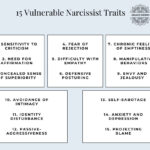Trauma Bonding Signs
Trauma bonds can go unnoticed for years and this is why they are so dangerous as victims might stay stuck in abusive relationships without being aware of what’s happening.
Learning about the common trauma bonding signs can help you become aware and understand whether you have trauma bonding with your partner.
If you identify trauma bonding signs in your relationship, it’s important to take a step back and reflect to understand what’s really happening in the relationship. Educating yourself about the topic will help you and empower you. As the saying goes, knowledge is power.
Breaking free from toxic and abusive relationships can be challenging, and I understand the difficulties involved having been there myself. But there is a way out!
If you’re interested in healing from narcissistic abuse, I warmly welcome you to my Narcissistic Abuse Recovery Program. It’s an easy self-paced online course which you can do at your own pace. My signature program combines scientific and spiritual tools for holistic healing of the body, mind, and spirit.
What are the trauma bonding signs?
Becoming aware of the signs of trauma bonding can be a transformative experience, as it opens your eyes to the dynamics at play within your relationship. You begin to see things from a different perspective, recognizing the patterns of manipulation and control that used to be unnoticed.
These signs may include cycles of idealization and devaluation, a sense of dependency and fear of abandonment, emotional highs and lows, and difficulty setting boundaries. By identifying these signs, you can take the first step towards breaking free from the cycle and seeking the support and healing you deserve. Let’s have a closer look at the main signs of trauma bonding:
#1. Your relationship feels toxic
Do you notice any behavioral toxic patterns in your relationship? Are you always walking on egg-shells waiting for the next big fight to break?
If you find yourself feeling anxious after a few weeks without conflict in the relationship, it might be because your good moments never last for too long.
When you develop trauma bonds in relationships with narcissists, you end up being a victim to the behavioral cycle of a narcissist. Narcissists go through cycles and alternate between love bombing and narcissist gaslighting.
You know that something is very wrong in the relationship but you don’t know exactly what it is. If this is the case, this could be a trauma bonding sign and your intuition is trying to warn you that there are problematic and toxic patterns in your relationship.
#2. You feel powerless and submissive
Do you frequently feel that you are being controlled by your partner? Narcissists can control you through manipulation and you can end up feeling physically, emotionally, sexually, spiritually, or financially abused.
Even if they don’t use force over you or directly threaten you, if you find yourself being submissive to avoid big fights or negative behavior from your partner it’s a sign of power imbalance. When you submit to your partner, you are giving them power over you and can make it more difficult to physically and psychologically detach from a narcissist.
If your partner has complete control in your relationship dynamic, it can be a sign of trauma bonding. This leaves you feeling helpless and at your abusers’ mercy, submitting to whatever they demand to hopefully get some love and affection.
#3. You’ve left before, but you keep going back
A big trauma bonding sign! Toxic relationships are difficult to leave because victims can develop deep emotional connections with a narcissist, despite the abuse they often suffer.
Trauma bonding results from intermittent positive reinforcement which makes the victims addicted to their abusers. Narcissists most often convince their partner that no one will ever love them more than they do and that they truly have a special connection.
Trauma bond withdrawal symptoms make it difficult to end the relationship for good. And for many survivors, it can feel safer to stay in an abusive relationship because of their fear of abandonment in relationships.
This could be an indication of codependency. When a codependent leaves a narcissist, most often they end up getting back together with their abuser as narcissists lure them back with their charm and manipulative lies.
If your relationship has an ‘on-again off-again’ pattern, take a step back and reflect on whether it’s in your best interest to get back together. Each time you accept your abusive partner back, you are indirectly telling them that they can keep pushing your boundaries until they become non-existent.
#4. You have good moments but too many bad ones
Do you find yourself holding on to the good moments you have together? Have you found yourself wishing that your partner would always be nice when you are in pain?
It’s normal to have arguments with a partner in a healthy loving relationship. However, if the bad moments outweigh the good ones, then what’s the point of being together? This might be a trauma bonding sign keeping you stuck in a toxic relationship.
Most people who get into abusive relationships experience euphoria that comes with the love bombing period. However this period is just temporary and is followed by weeks of suffering due to the narcissistic cycle. Learn more about what is a narcissistic cycle to understand how you pass from a stage of idealization, devaluation and discarding.
It can be tempting to just forget everything that happened and get lost in the love bombing period once your abuser starts using his charm again. But keep in mind that it will soon fade off!
#5. You justify your partner’s behavior
It’s extremely difficult to accept the fact that someone who presented himself like your soulmate, is actually an abusive narcissist. It’s even more confusing since the relationship shifts from incredibly good experiences, to abusive and manipulative phases.
If you find yourself denying that your partner is being abusive, it could be a trauma bonding sign. Just because someone had a bad day at work, or is going through a rough period, does not mean it’s okay to accept abusive and manipulative behavior.
Our actions and reactions toward our human experience define who we are. Everyone goes through difficult moments in their lives, but how you handle them defines who you are and what kind of personality you have. Even if your partner had a traumatic past, it doesn’t make it okay to accept their abusive behavior. No amount of unconditional love or empathy can heal a narcissist!
#6. You are scared to tell your friends and family
It’s not easy to share your concerns and anxieties with your friends and family. Your own abuser might warn you not to tell anyone about your private life together.
Or it might be scary of ruining their reputation, so you find yourself hiding the truth to protect their image.
Try to stop for a moment and think about this, feeling scared to tell the truth means that something is very wrong. Otherwise is it scary to share your stories with your dear friends and family? Protecting an abusive partner is not a present characteristic in a healthy loving relationship.
Breaking Free: Overcoming Trauma Bonding
The above mentioned points are all signs of a trauma bond when you’re trying to break up or divorcing a narcissist. No one deserves to be in an abusive relationship. Your life CAN and WILL get better, once you decide to take the necessary steps to get over your trauma bond.
Seek support through therapy or counseling and surround yourself with trustworthy friends and family to help you break free from your abusive relationship.
My Related Services:
–Narcissistic Abuse Recovery Program: Join a structured program that provides tools, resources, and guidance to help you navigate and heal from the impact of narcissistic abuse.
–Mindfulness Meditation Practice: Discover the power of mindfulness with me as your meditation teacher. This practice has been a transformative tool in helping me gain mental clarity, rebuild self-trust, and respond consciously rather than reacting impulsively. Book a free call today and learn how mindfulness can calm your nervous system and bring peace into your life.
–Email Advice: Get guidance, insights, and support directly to your inbox.
FAQs
Common trauma bonding signs present in abusive relationships are:
-Your relationship feels toxic
-You feel powerless and submissive
-You’ve left before, but you keep going back
-You gave good moments, but too many bad ones
-You justify your partners’ behavior
-You are scared to tell your friends and family
Trauma bonding occurs as a result of intermittent positive reinforcement. Abusive partners like narcissists switch from love bombing to dismissive and abusive behaviors to get their partners psychologically addicted. This way they will be easier to manipulate and taken advantage of.
The 3 major signs of a trauma bond are:
1. Justifying your abuser’s behavior
2. Feeling stuck in an abusive relationship
3. Any form of dependency on your abuser
Related articles which you might find helpful:
10 Signs of Trauma Bonding
Trauma Bonding with Narcissists
7 Stages of Trauma Bonding
Narcissistic Abuse and Spiritual Awakening
Self Healing From Narcissistic Abuse






